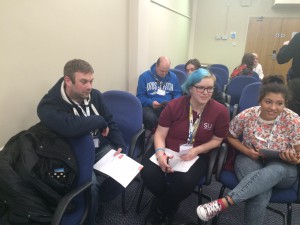I had a brilliant day at the NUS FEstival 2014 conference today in Milton Keynes. The conference is run annually and supports new learner reps with getting involved in the key issues relating to their experiences as FE learners. This is an annual event for students’ unions and learner voice staff in further education colleges.
Now in its’ fifth year, the event brings together student leaders, reps, governors as well as staff who support learner voice within colleges to celebrate and showcase their work, as well as providing a space to discuss and learn about the key issues affecting students in colleges at the moment.
The event was opened by Joe Vinson, NUS Vice President FE, who stressed that there was a sea change happening in colleges with the recognition of the importance of the learner voice.
I participated in a session led by Gareth Lindrop, NUS FE Engagement & Quality Manager on what makes good learning and teaching. The learners shared their views and showed an appreciation of the different approaches you can use to make learning more active, more participatory and more authentic. The importance of differentiation and support for learners with learning difficulties and disabilities was also highlighted.
Learners shared their approaches to gathering feedback on what constitutes an effective learning experience from their peers. Approaches included learning walks, learner voice surveys, visiting classes, questionnaires and speaking to learners in the canteen. I was struck by how many learners were able to clearly articulate what makes an effective learning experience for them and their subject area.
Technology was mentioned and in some cases recognised as a missed opportunity for extending learning. For example, where online simulations could support learners studying chemistry and physics.
NUS are developing an online audit tool to support learner reps to review learning and teaching practice in their college. So watch this space for these developments.
I then ran a workshop around the FE Digital Student project – incorporating these slides and running a series of activities so as to capture learners’ views on how they were using technology in their college life and in their learning.

I ran the following three group activities:
1. What are the challenges you experience in using technology in your college?
See the feedback captured on the padlet
2. How does your college/provider engage you in discussions about technology?
3.What one thing should colleges/providers do to enhance your digital experience? See the feedback from this activity.
The learners were very engaged and articulate about the issues and what they saw as the key challenges in their colleges. The importance of supporting staff with the development of their digital literacies was top issue as learners were recognising that staff were not always confident or competent in their use of technology. Interactive whiteboards for example, were just being used for projection only and their interactivity and ability to fully engage learners was being under-utilised. Learners were keen to work in partnership with staff to co-develop their digital literacy skills.
The second key challenge related to the ease of access to wifi, college systems and services. Some colleges were saying how difficult it was for learners to bring their own devices and to have wifi access. Social media tools were being blocked across the board for some colleges whereas others were setting different permissions for their use depending on learner cohorts.
We were also able to capture some learner views on video to add to our collection of FE Learner voices which will be an output from the FE Digital Student project and will be launched in the new year as part of the FE Digital Student Consultation events. To join us at these events please register here.
I felt very privileged to have the opportunity of speaking to these engaged learners who see their role in improving the quality of the learner experience for all and recognise the importance of working in partnership with staff to fully realise the potential of the digital.
